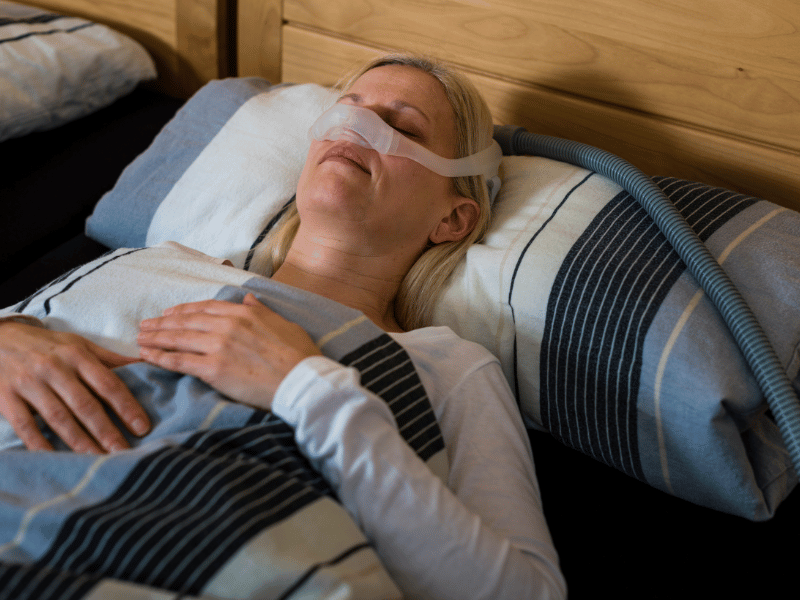


Does CBD affect REM sleep? While there aren’t a lot of research about the effects of CBD on REM sleep, some research seem to suggest that CBD can have an effect on the various sleep stages and improve overall sleep quality.
In this article, we will discuss what CBD is and understand the effect that it can have on sleep.

CBD, also known as cannabidiol, is one of the active ingredients that is found in cannabis (marijuana). CBD can either be derived from a hemp plant or a non-hemp plant and typically does not cause you to feel a sense of ‘high’ [1].
In the U.S., CBD products have also been legalized in most states since Congress passed a law, removing hemp from the federal Controlled Substances Act [2].
CBD can come in many different forms, including:
When it comes to its effect on sleep or REM sleep in particular, the results are still mostly inconclusive. However, early research seems to suggest that it could potentially be used to reduce poor sleep quality and promote better sleep.
In one study, it was found that CBD led to more non-rapid eye movement (NREM) sleep but this effect remained modest [3]. In a separate study, administration of CBD was found to improve sleep quality for patients with neuropsychiatric disorders [4].
Another investigation also concluded that high doses of CBD can help increase sleep duration [5]. Some studies from the 1970s also often indicated mixed findings, indicating that it decreases sleep latency and wake after sleep onset or that there was an increase in deep sleep or slow-wave sleep and a decrease in REM sleep [6].
It seemed that in the short-term, use of CBD could be beneficial for sleep but that long-term use could have negative implications such as increased sleep disturbances or sleep disruptions, which are bad for health.
CBD is also said to have therapeutic effects on sleep disorders. However, greater research is still needed to have a better understanding of how it is beneficial.

Insomnia is one of the more prevalent sleep disorders that affects a significant amount of the population. Besides medications and cognitive behavioral therapy, it also historically known for cannabinoids to be used as a sleeping aid.
Some studies show that cannabinoids may help to reduce the severity of insomnia symptoms however, most studies indicated mixed results. A study that was conducted using rat models found that mid to high doses of CBD increased total sleep percentage and that there seemed to be a dose-dependent effect on REM sleep latency.
Thus, the effect that CBD has on insomnia is not just dose-dependent but it could also depend on the type and combination that is being used. However, more studies are needed to better understand the effects that it can have on the various sleep stages before using it to treat insomnia [7].

Obstructive sleep apnea (OSA) is also another common sleep-related disorder that many people struggle with in the U.S. Continuous positive airway pressure (CPAP) therapy is normally used as a treatment option for sleep apnea patients.
However, in more recent times, there has been an increased interest in the use of cannabinoids. In animal studies, cannabinoids are seen to help with reducing and suppressing apneas but it may also reduce REM sleep and sleep efficiency. It’s worth noting that larger studies and clinical trials are needed to assess the long-term efficacy of such use [7].

Aside from sleep disorders, CBD is also commonly used to treat chronic pain and anxiety disorders. However, it is also important to note that there may be some risks that come with taking them, be it for sleep, pain, or anxiety relief.
Some potential side effects of CBD in the short and long term include [8]:
While CBD is generally regarded as safe to take for its sedative effects and help with pain relief, it is still important to consider the side effects and how it may interact with other sleep medicines. Other things to consider would also include the quality of CBD, and the dosing levels.
In conclusion, CBD seems to show promising potential in improving sleep quality and alleviating the symptoms of sleep disorders such as insomnia and sleep apnea. However, further research is needed to understand the impact that it has on REM sleep fully.
If you are looking for a natural sleep aid to help improve your sleep, consider using ShutEye® app. ShutEye is a sleep app that offers sleep tools ranging from sleep sounds to relaxing meditations to help you fall asleep easily at night.
Babson, K.A., Sottile, J. and Morabito, D. (2017) Cannabis, Cannabinoids, and Sleep: a Review of the Literature. Curr Psychiatry Rep, 19(23), pp. 1-12 [online]. Available at: https://www.med.upenn.edu/cbti/assets/user-content/documents/s11920-017-0775-9.pdf
Centre for Disease Control and Prevention (2025) About CBD [online]. Available at: https://www.cdc.gov/cannabis/about/about-cbd.html
Grinspoon, P. (2024) Cannabidiol (CBD): What we know and what we don't [online]. Available at: https://www.health.harvard.edu/blog/cannabidiol-cbd-what-we-know-and-what-we-dont-2018082414476
Kaul, M., Zee, P. C., & Sahni, A. S. (2021). Effects of Cannabinoids on Sleep and their Therapeutic Potential for Sleep Disorders. Neurotherapeutics, 18(1), pp. 217-227 [online]. Available at: https://doi.org/10.1007/s13311-021-01013-w
Samanta, A., Aleman-Zapata, A., Agarwal, K., Özsezer, P., Alonso, A., Van der Meij, J., Rayan, A., Navarro-Lobato, I., and Genzel, L. (2023) CBD lengthens sleep but shortens ripples and leads to intact simple but worse cumulative memory. IScience, 26(11), 108327 [online]. Available at: https://doi.org/10.1016/j.isci.2023.108327
Shannon, S., Lewis, N., Lee, H., & Hughes, S. (2019) Cannabidiol in Anxiety and Sleep: A Large Case Series. The Permanente Journal, 23, 18-041 [online]. Available at: https://doi.org/10.7812/TPP/18-041
Substance Abuse and Mental Health Services Administration (2023) CANNABIDIOL (CBD) – POTENTIAL HARMS,
SIDE EFFECTS, AND UNKNOWNS [online]. Available at: https://library.samhsa.gov/sites/default/files/pep22-06-04-003.pdf
Zhornitsky, S., & Potvin, S. (2012) Cannabidiol in humans-the quest for therapeutic targets. Pharmaceuticals (Basel, Switzerland), 5(5), pp. 529–552 [online]. Available at: https://doi.org/10.3390/ph5050529